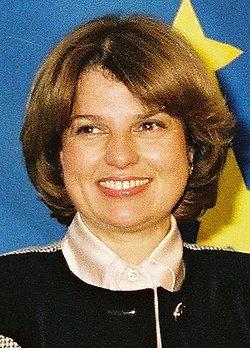| No. | Portrait | Name
(Birth–Death) | Election
(Parliament) | Term of office | Political party | Cabinet | President
(Term) |
|---|
| Took office | Left office | Time in office |
|---|
| 1 |  | İsmet İnönü
(1884–1973) | 1923 (2nd) | 30 October 1923 | 22 November 1924 | 1 year, 23 days | Republican People's Party | İnönü I | | Mustafa Kemal Atatürk

(1923–1938) |
|---|
| İnönü II |
| 2 |  | Fethi Okyar
(1880–1943) | 22 November 1924 | 6 March 1925 | 104 days | Republican People's Party | Okyar |
|---|
| (1) |  | İsmet İnönü
(1884–1973) | 6 March 1925 | 1 November 1937 | 12 years, 240 days | Republican People's Party | İnönü III |
|---|
| 1927 (3rd) | İnönü IV |
| İnönü V |
| 1931 (4th) | İnönü VI |
| 1935 (5th) | İnönü VII |
| 3 |  | Celâl Bayar
(1883–1986) | 1 November 1937 | 25 January 1939 | 1 year, 85 days | Republican People's Party | Bayar I |
|---|
| Bayar II | | İsmet İnönü

(1938–1950) |
|---|
| 4 | 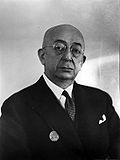 | Refik Saydam
(1881–1942) | 25 January 1939 | 8 July 1942
(Died in office) | 3 years, 164 days | Republican People's Party | Saydam I |
|---|
| 1939 (6th) | Saydam II |
| 5 |  | Şükrü Saracoğlu
(1887–1953) | 8 July 1942 | 7 August 1946 | 4 years, 30 days | Republican People's Party | Saracoğlu I |
|---|
| 1943 (7th) | Saracoğlu II |
| 6 |  | Recep Peker
(1889–1950) | 1946 (8th) | 7 August 1946 | 9 September 1947 | 1 year, 33 days | Republican People's Party | Peker |
|---|
| 7 | 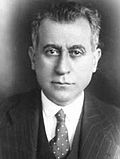 | Hasan Saka
(1885–1960) | 9 September 1947 | 16 January 1949 | 1 year, 129 days | Republican People's Party | Saka I |
|---|
| Saka II |
| 8 | 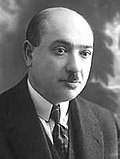 | Şemsettin Günaltay
(1883–1961) | 16 January 1949 | 22 May 1950 | 1 year, 126 days | Republican People's Party | Günaltay |
|---|
| 9 |  | Adnan Menderes
(1899–1961) | 1950 (9th) | 22 May 1950 | 27 May 1960
(Deposed) | 10 years, 5 days | Democrat Party | Menderes I | | Celâl Bayar

(1950–1960) |
|---|
| Menderes II |
| 1954 (10th) | Menderes III |
| Menderes IV |
| 1957 (11th) | Menderes V |
| 10 |  | Cemal Gürsel
(1895–1966) | — | 27 May 1960 | 27 October 1961 | 1 year, 153 days | Military | Gürsel I | | National Unity Committee
(1960–1961) |
|---|
| Gürsel II |
| (1) | 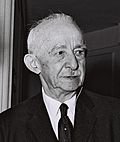 | İsmet İnönü
(1884–1973) | 1961 (12th) | 27 October 1961 | 20 February 1965 | 3 years, 116 days | Republican People's Party | İnönü VIII | | Cemal Gürsel

(1961–1966) |
|---|
| İnönü IX |
| İnönü X |
| 11 | 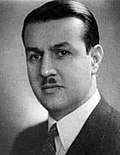 | Suat Hayri Ürgüplü
(1903–1981) | 20 February 1965 | 27 October 1965 | 249 days | Justice Party | Ürgüplü |
|---|
| 12 | 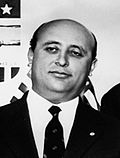 | Süleyman Demirel
(1924–2015) | 1965 (13th) | 27 October 1965 | 26 March 1971 [a] | 5 years, 150 days | Justice Party | Demirel I |
|---|
| 1969 (14th) | Demirel II | | Cevdet Sunay

(1966–1973) |
|---|
| Demirel III |
| 13 | 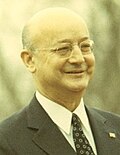 | Nihat Erim
(1912–1980) | 26 March 1971 | 17 April 1972 | 1 year, 22 days | Independent | Erim I |
|---|
| Erim II |
| 14 |  | Ferit Melen
(1906–1988) | 17 April 1972 | 15 April 1973 | 363 days | Republican Reliance Party | Melen |
|---|
| 15 |  | Naim Talu
(1919–1998) | 1973 (15th) | 15 April 1973 | 25 January 1974 | 285 days | Independent | Talu | | Fahri Korutürk

(1973–1980) |
|---|
| 16 | 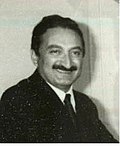 | Bülent Ecevit
(1925–2006) | 25 January 1974 | 17 November 1974 | 296 days | Republican People's Party | Ecevit I |
|---|
| 17 |  | Sadi Irmak
(1906–1990) | 17 November 1974 | 31 March 1975 | 134 days | Independent | Irmak |
|---|
| (12) |  | Süleyman Demirel
(1924–2015) | 31 March 1975 | 21 June 1977 | 2 years, 82 days | Justice Party | Demirel IV |
|---|
| (16) |  | Bülent Ecevit
(1925–2006) | 1977 (16th) | 21 June 1977 | 21 July 1977 | 30 days | Republican People's Party | Ecevit II |
|---|
| (12) |  | Süleyman Demirel
(1924–2015) | 21 July 1977 | 5 January 1978 | 168 days | Justice Party | Demirel V |
|---|
| (16) |  | Bülent Ecevit
(1925–2006) | 5 January 1978 | 12 November 1979 | 1 year, 311 days | Republican People's Party | Ecevit III |
|---|
| (12) |  | Süleyman Demirel
(1924–2015) | 12 November 1979 | 12 September 1980
(Deposed) | 305 days | Justice Party | Demirel VI |
|---|
| 18 |  | Bülend Ulusu
(1922–2015) | — | 21 September 1980 | 13 December 1983 | 3 years, 83 days | Military | Ulusu | | National Security Council
(1980–1982) |
|---|
| Kenan Evren
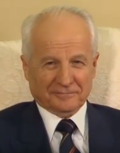
(1982–1989) |
|---|
| 19 |  | Turgut Özal
(1927–1993) | 1983 (17th) | 13 December 1983 | 9 November 1989 | 5 years, 331 days | Motherland Party | Özal I |
|---|
| 1987 (18th) | Özal II |
| 20 |  | Yıldırım Akbulut
(1935–2021) | 9 November 1989 | 23 June 1991 | 1 year, 226 days | Motherland Party | Akbulut | | Turgut Özal

(1989–1993) |
|---|
| 21 |  | Mesut Yılmaz
(1947–2020) | 23 June 1991 | 20 November 1991 | 150 days | Motherland Party | Yılmaz I |
|---|
| (12) |  | Süleyman Demirel
(1924–2015) | 1991 (19th) | 20 November 1991 | 16 May 1993 | 1 year, 177 days | True Path Party | Demirel VII |
|---|
| 22 | 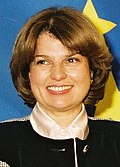 | Tansu Çiller
(born 1946) | 25 June 1993 | 6 March 1996 | 2 years, 255 days | True Path Party | Çiller I | | Süleyman Demirel

(1993–2000) |
|---|
| Çiller II |
| Çiller III |
| (21) |  | Mesut Yılmaz
(1947–2020) | 1995 (20th) | 6 March 1996 | 28 June 1996 | 114 days | Motherland Party | Yılmaz II |
|---|
| 23 |  | Necmettin Erbakan
(1926–2011) | 28 June 1996 | 30 June 1997 [b] | 1 year, 2 days | Welfare Party | Erbakan |
|---|
| (21) |  | Mesut Yılmaz
(1947–2020) | 30 June 1997 | 11 January 1999 | 1 year, 195 days | Motherland Party | Yılmaz III |
|---|
| (16) |  | Bülent Ecevit
(1925–2006) | 11 January 1999 | 18 November 2002 | 3 years, 311 days | Democratic Left Party | Ecevit IV |
|---|
| 1999 (21st) | Ecevit V | | Ahmet Necdet Sezer
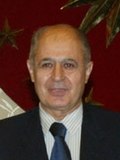
(2000–2007) |
|---|
| 24 | 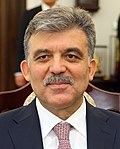 | Abdullah Gül
(born 1949) | 2002 (22nd) | 18 November 2002 | 14 March 2003 | 116 days | Justice and Development Party | Gül |
|---|
| 25 |  | Recep Tayyip Erdoğan
(born 1954) | 14 March 2003 | 29 August 2014 | 11 years, 168 days | Justice and Development Party | Erdoğan I |
|---|
| 2007 (23nd) | Erdoğan II | | Abdullah Gül

(2007–2014) |
|---|
| 2011 (24th) | Erdoğan III |
| 26 | 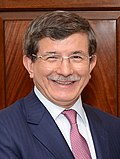 | Ahmet Davutoğlu
(born 1959) | 29 August 2014 | 24 May 2016 | 1 year, 269 days | Justice and Development Party | Davutoğlu I | | Recep Tayyip Erdoğan

(2014–2018) |
|---|
| Jun. 2015 (25th) | Davutoğlu II |
| Nov. 2015 (26th) | Davutoğlu III |
| 27 |  | Binali Yıldırım
(born 1955) | 24 May 2016 | 9 July 2018 | 2 years, 46 days | Justice and Development Party | Yıldırım |
|---|


